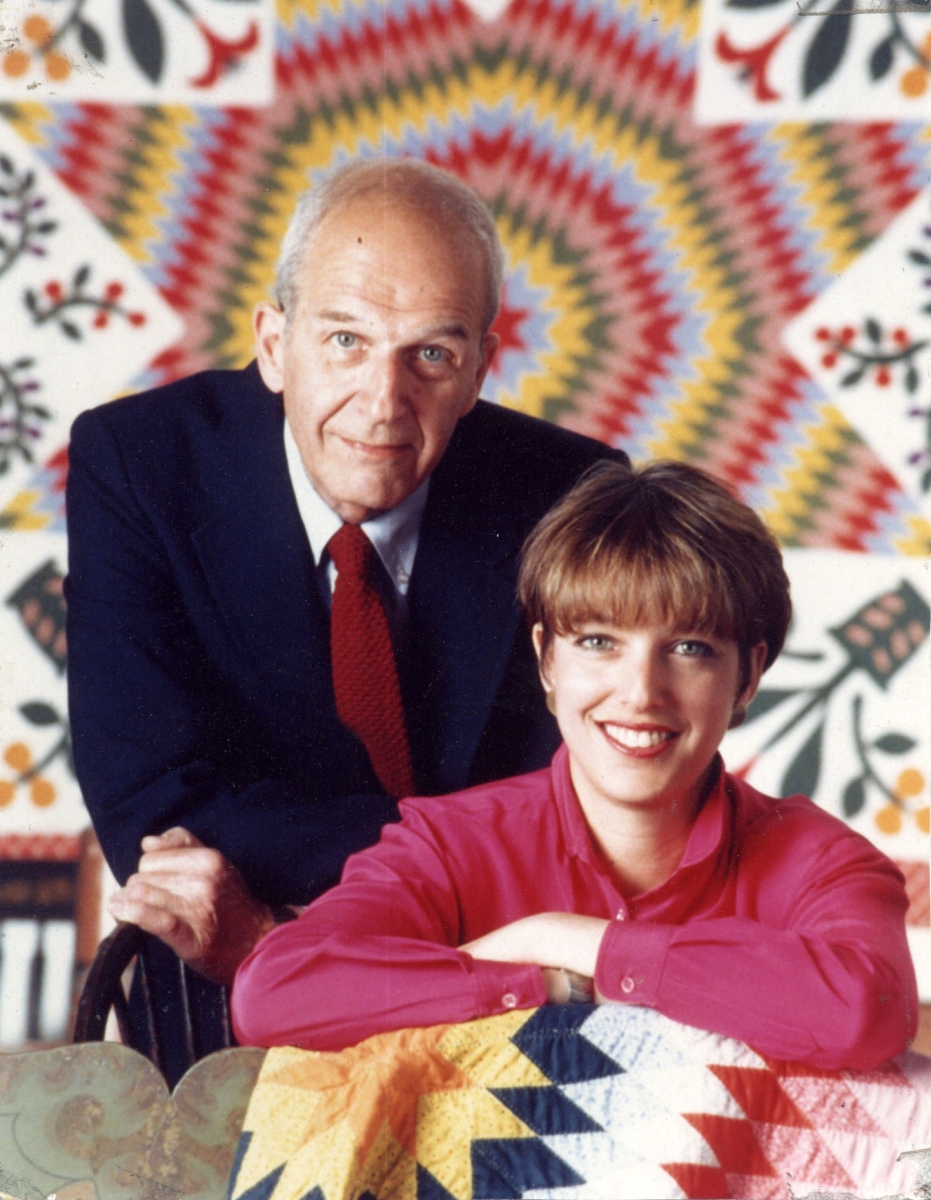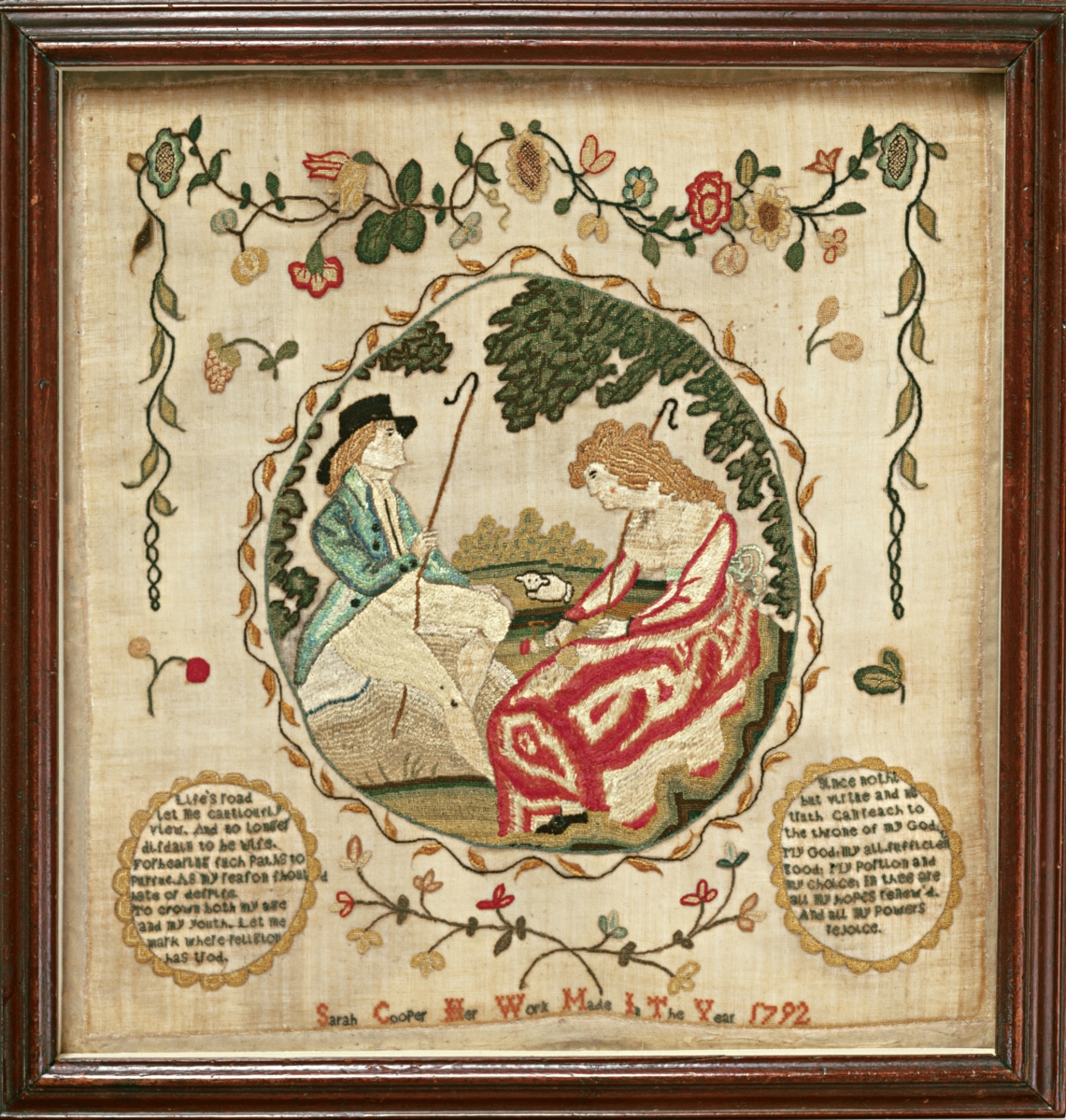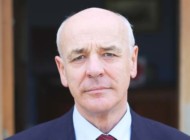
Morris and Amy Finkel in the mid-1980s
with antique quilts, prior to specializing in the field of antique schoolgirl samplers.
Amy Finkel’s father, Morris Finkel, opened his antiques shop on Philadelphia’s Pine Street in 1947. It’s been in that circa 1840 building ever since, carried forward by Amy, who became his business partner. The two learned from each other, he bringing his expertise in antique furniture and she expanding the business’ market into hers: Seventeenth through Nineteenth Century samplers, needlework and silk embroideries. They were a team. On the occasion of Father’s Day, we sat down with Amy to talk about her father’s legacy, impact on her career and the lessons learned along the way.
Tell me about your father.
By nature, my dad was a terrific guy with a strong work ethic, an enormous store of knowledge, a good sense of humor, great warmth and compassion. Soft spoken but not reticent to speak his mind, a gentleman with a twinkle in his eye. He was smart and intuitive about business. He knew that the more one learned about an object – of any sort – the more one was likely to appreciate and enjoy it. He would say, “Knowing makes seeing richer,” and he knew that applied to the two of us as well as to our clients. My parents loved to travel the world; he felt that learning about objects from other cultures helped in the understanding of influences on American material. He encouraged me to take advantage of any educational opportunity. For example, we each attended the art appreciation course at the Barnes Foundation, studying under Violette de Mazia.
How did your father get his start dealing antiques?
My grandfather, Sigmund Finkel, was in the antiques business, specializing in early metals – silver, brass, copper. After my father served as a Navy lieutenant in World War II and graduated from University of Pennsylvania, he decided to strike out on his own instead of working for his father and opened his own antiques shop on Philadelphia’s renowned Pine Street in 1947.
What did he focus on?
For many decades his passions and strengths were furniture – mostly American. Until the early 1980s, the business focused on selling antiques to dealers from other parts of the United States. What was wonderful about my father is that he encouraged me to pursue my own area of interest, which led to the focus on textiles.
How old were you when you first started working with him?
I worked for the business two summers while in college – getting exposed to all aspects of it. When I graduated from college, in 1975, I jumped in full time. In 1978, my father recognized that we had a partnership in the business and changed the name of the business to M. Finkel & Daughter.

Marsh School sampler made by Sarah Cooper, 1792, one of those acquired by the firm in a sealed bid auction in 1987.
If he were still alive today, how would he adjust to the market in the current pandemic era? What would he say about it?
For someone of his generation he was unusually flexible and nimble and adjusted easily to change. He pushed for the early computerization of our business records, database and archives. He was also greatly involved in the development of our website, which made us an early adopter in the antiques industry and set us up well for the present and future. In today’s world, my father would be thinking about how to enhance our engagement with collectors without face-to-face meetings.
Do you have a piece that your father gave you that you’d never sell? What makes it so special?
While my father gave me certain pieces that I cherish, what is more important to me is that my dad gave me 35 years of working together, five to six days a week, side-by-side with a supportive and loving mentor – who also treated me as a valued and respected partner.
What was the best piece of advice your father gave you?
After I had been with him for less than a year, he suggested that I think about developing a specialty and make that my own – excellent advice. Women’s studies were in the forefront then and I gravitated to antique quilts and needlework, shifting somewhat exclusively to schoolgirl samplers and silk embroideries by the late 1980s. He quickly became just as interested and knowledgeable in this field as I am.
Do you have a favorite memory with him you can share with us?
In 1987, an opportunity arose for us to submit a private, sealed bid on three highly significant late Eighteenth Century Philadelphia samplers. I was beside myself with anxiety. He understood that, while this was an important opportunity, it was one of many and we did not have to succeed with every such opportunity to have a successful business. We put a great deal of work into understanding the importance and value of these three samplers and submitted a commensurate bid. Fortunately, ours was the winning bid of the four submitted. We sold two of the samplers to Winterthur Museum and the third to Betty Ring. While I was very happy with this result, I learned to put each business opportunity in perspective. It also helped me in dealing with such opportunities that, over time, we succeeded in many of them.
-Greg Smith




